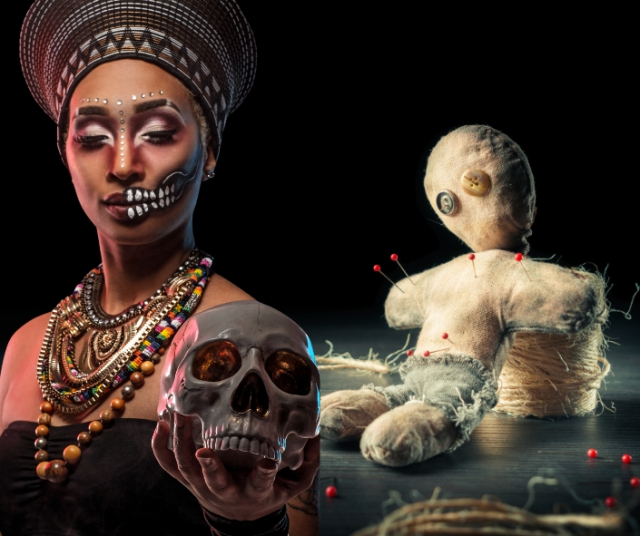Voodoo is a spiritual and religious practice that has fascinated and intrigued people around the world for centuries. Originating in West Africa and rooted in the culture and history of Haiti and other parts of the Caribbean, voodoo is much more than the stereotypical image of dolls and spells. In this article, we will explore in depth the origins, beliefs, practices, and cultural impact of voodoo.
The voodoo.
Voodoo is a spiritual tradition that has its roots in the religious practices of people who were enslaved and transported from Africa to the plantations of America during the transatlantic slave trade. Although often mistakenly associated with evil and black magic, voodoo is actually a complex and multifaceted religion that incorporates elements of African spirituality, Catholicism, and indigenous traditions.
Origins of voodoo.
Voodoo has its roots in the religious practices of African peoples, especially those of West Africa, such as the Fon, the Ewe, and the Yoruba. During the slave trade, these religious traditions mixed with Catholic beliefs and indigenous practices of the Caribbean islands, giving rise to what we know today as Haitian voodoo, also known as New Orleans voodoo.
Voodoo beliefs and practices.
Voodoo beliefs and practices are fundamental to understanding this religion and spirituality rooted in African and Caribbean culture. Voodoo is based on a complex worldview that recognizes the existence of a spiritual world inhabited by deities, spirits and ancestors, all of which play a vital role in everyday life and events that affect people. These beliefs are intertwined with a series of ritual practices that seek to honor, communicate with, and gain the favor of these spiritual entities.
One of the distinctive characteristics of voodoo is the belief in loas, which are deities and spirits revered by voodoo practitioners. Loas are considered intermediaries between the material world and the spiritual world, and are believed to influence various aspects of human life, such as health, prosperity, love and protection. Each loa has specific attributes and characteristics, and is invoked through rituals and offerings to seek their help and guidance.
Rituals and ceremonies play a central role in the practice of voodoo. These can range from simple acts of devotion at home to elaborate community ceremonies involving music, dance, and animal sacrifices. During these ceremonies, voodoo practitioners may enter states of trance or spirit possession, in which loas temporarily take control of their bodies to communicate with worshipers and offer guidance and healing.
In addition to the worship of loas, voodoo also includes practices of sorcery and magic, which can be used to influence events and circumstances. These may include the use of voodoo dolls, spells and incantations, and objects imbued with spiritual power. However, it is important to note that voodoo is not limited to black magic or malevolent manipulation, but is also used for benevolent purposes such as healing, protection, and spiritual strengthening.
Elements of voodoo.
Voodoo incorporates a variety of ritual and symbolic elements, including:
- Loas: Deities and spirits revered in voodoo, which may represent forces of nature, ancestors, or spiritual energies.
- Altar: A sacred space dedicated to the religious practices of voodoo, which may include images of praises, candles, incense, and offerings.
- Spells and Charms: Magical formulas used to influence events and circumstances, often through the use of personal or symbolic objects.
- Voodoo dolls: Representations of people used in witchcraft and healing rituals, which can be used to bless or curse.
Voodoo in popular culture .
Voodoo has been the subject of fascination and misunderstanding in popular culture, especially in films, books, and plays. Unfortunately, these depictions often perpetuate harmful stereotypes and false beliefs about voodoo as a dark and dangerous practice. However, Voodoo remains an important part of the cultural identity of Haiti and other Caribbean communities, where it is practiced as a legitimate and respected religion.
Voodoo and resistance.
Voodoo has played a significant role in the resistance and struggle for liberation in Afro-descendant communities, particularly in Haiti during the Haitian Revolution. During this historical period, voodoo became a powerful tool for resistance against colonial oppression and slavery. Voodoo rituals and ceremonies were used as a means to unify the community, strengthen morale, and foster solidarity among the enslaved.
Voodoo also served as a means of empowerment for those fighting for their freedom. The belief in loas as protectors and spiritual guides provided comfort and hope to the enslaved, inspiring them to resist and rebel against their oppressors. Revolutionary leaders, such as Toussaint Louverture and Boukman Dutty, were inspired by the teachings and practices of voodoo to organize and lead the struggle for independence.
In addition to its role in the Haitian Revolution, voodoo has been a form of ongoing resistance in black communities around the world. Through its rituals, beliefs and practices, voodoo has provided a sense of cultural identity and spirituality, as well as a means to resist oppression and marginalization. In this sense, voodoo represents a form of cultural and spiritual resistance that has endured over time.
Voodoo is a rich and complex religion that has played a significant role in the history and culture of the Caribbean. Although often misunderstood and stigmatized, voodoo is a legitimate expression of spirituality and resistance that continues to be practiced and revered by millions of people around the world. By learning more about voodoo and challenging the negative stereotypes surrounding it, we can promote a greater understanding and appreciation of this ancient religious tradition.






